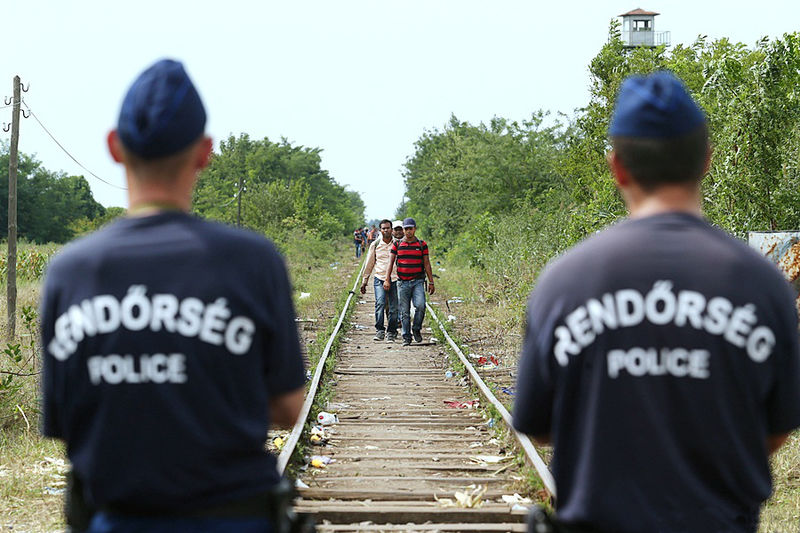By Tsarizm Staff | March 30, 2020

Image by Gémes Sándor/SzomSzed
The refusal of the Visegrad countries (V4 aka Czechia or Czech Republic, Hungary, Poland and Slovakia), to provide access to a large number of migrants from North Africa and the Middle East is well documented. In fact, it is even vilified by the Western mainstream press. However, what is not well-known is the policy of these nations to accept large numbers of immigrants from Slavic and other similar cultures. This has allowed Central Europe to alleviate the strain on its work force while maintaining its traditional Christian culture.
The nations of the region have gone so far as to incur the wrath of the E.U. bureaucracy in Brussels, which initiated infringement procedures against Hungary, Poland and the Czech republic for not following the European Union’s dictates to resettle migrants from Greece and elsewhere on the European periphery.
“Poland, Slovakia, Czech Republic, and Hungary have taken strong anti-migrant stances compared to Western European nations of Germany, France, Italy, and the United Kingdom. However, despite the extreme measures, the faster developing East European nations have accommodated other Slovaks willing to work for less, and in less desirable jobs,” explains Yuri Vanetik, an American attorney and political strategist who is often engaged to advise on policies and business transactions in Eastern Europe.
“Poland and Hungary have taken in many people from Ukraine and Moldova. They have avoided allowing migrants from Yemen and Syria into their countries. The people in politics and academia in the V4 that I often work with attribute this to challenges they anticipate in the integration of migrants from the Middle East and Africa due to different cultural norms,” explains Vanetik. As developing economies, they believe that the non-assimilation history of these migrants would be economically devastating. We have to take into account citizens first and foremost, my colleagues in Poland and Slovakia proclaim,” explains Vanetik.
For instance, when it comes to the European refugee crisis, Poland’s ruling Law and Justice (PIS) party has distinguished itself with strong anti-migrant stances. But when it comes to finding workers to take on the low-paying jobs Poles no longer want, the government has been quite happy to let in a historic influx of badly needed foreigners, proclaims a June 2019 Politico article, Poland Two Faced Immigration Strategy by Makana Eyre and Martin Goillandeau.
“In 2017, the last year for which figures are available, Poland issued more visas to foreign workers than any other country in Europe. Eighty-five percent of them went to people from Ukraine — a predominantly white, Christian country — looking for work.” However, hardly any Muslim refugees escaping conflict in Syria and Yemen have resettled in Poland, point out Eyre and Goillandeau in their article.
“Today, one in every three migrants in the world is in a European country, where the number of migrants increased rapidly over the last four decades. For example, in Kazakhstan, almost 20 percent of the population is immigrant, and in Ukraine and Russia, immigrants make up 10 percent and 8 percent of the population,” respectively, adds Vanetik.
The Czech Republic has been more open to E.U. demands, where Slovakia continues to be more restricted to foreign seasonal workers. Hungary and the V4 continue to be the beneficiaries of investment capital from Western Europe – particularly from Germany.
Hungary has been notoriously hard lined when it comes to stopping migration through its territory, even erecting dreaded ‘fences’ to halt illegal immigration. Budapest has also campaigned against the Soros machine, going so far as to force the financier’s lifetime pet project, the ‘progressive’ Central European University, from its territory.
“They [George Soros and his “army”] believe in a multi-cultural Europe. They don’t like Christian Europe. The don’t like the traditions of Christian Europe. They don’t like Christians at all,” declared Hungarian Prime Minister Viktor Orban in 2018.
“We openly divulge and acknowledge our objectives. We want a Hungarian Hungary and a European Europe. This is only possible if we also affirm that we want a Christian Hungary in a Christian Europe.”
These phenomena have caused much consternation in the halls of power of the European Parliament, where open-border policy reigns supreme, although the tune has changed during the recent crisis of the Chinese coronavirus, with most European nations closing their borders to all but essential traffic.
Cases continue to rise in the region; however, most of the cases seem to stem from migrants legally allowed to resettle, such as in Hungary where an Iranian immigrant unknowingly spread the virus.
In any event, the current global pandemic will certainly be used by Visegrad governments to bolster their anti-immigration stance. However, a better argument against uncontrolled illegal immigration and open borders may be the simple fact that these policies maintain a nation’s cultural identity, security and religious preference — a much more valid reason to reassess impact and policies of Middle Eastern and North African migration in the long run.
Migrants to Eastern Europe who are fellow Slavs integrate better than those from truly disparate cultures. A comparison between the problems experienced by Germany and France versus the Visegrad region’s scenario bear out this conclusion.
- Is Belarus The Last Oasis Of Freedom In Europe?
- EU And US Clash Over Move To Topple Kosovo Government
This piece originally appeared on Tsarizm.com and is used by permission.
The opinions expressed by contributors and/or content partners are their own and do not necessarily reflect the views of Steve Gruber.
Join the Discussion
COMMENTS POLICY: We have no tolerance for messages of violence, racism, vulgarity, obscenity or other such discourteous behavior. Thank you for contributing to a respectful and useful online dialogue.